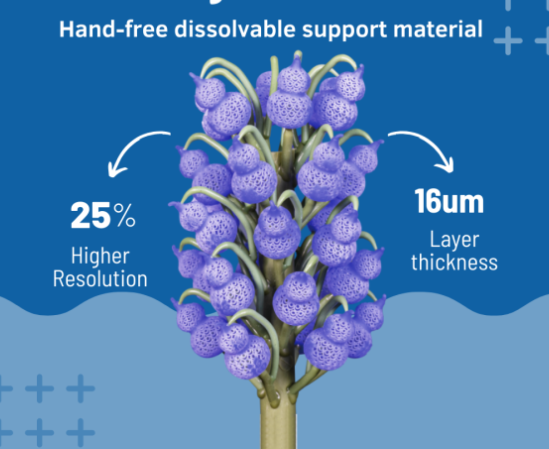













JE- WaxJet 400 is a cutting-edge, large-scale 3D printer engineered for precision and versatility, designed to meet the demands
of advanced manufacturing.
This innovative machine excels in producing intricate wax patterns with exceptional smoothness and detail, making it ideal for
applications in jewelry design, fine crafts, precision casting, and aerospace components.
Printing Technology: MultiJet Wax Printing (MJP)
Build Plate Dimensions: 294*211*144mm
Printing Mode: XHD: 1200*1200*1600dpi (xyz)
Layer Thickness: 16um/50um
Dimensional Accuracy: ±0.04mm/20mm
Standard Power Supply: AC220-240V, 50Hz, 4KW, 20amp
Machine Dimensions: 1700*1000*1400mm
Uncrated: 380 Kgs
Crated: 500 kgs
High Resolution - Offers a print resolution of 1200 x 1200 x 1600 dpi in XYZ axes.
Efficient Support Structure - Utilizes a honeycomb support structure to reduce the amount of support wax used.
Advanced Build Material - Features a new flexible purple wax build material.
Low Maintenance - Designed with fewer moving parts, resulting in less maintenance and downtime.
Remote Access - Equipped with Windows-based software for remote operation.
Durability-Enhanced with added support for stone-in-place casting.
Cost-Effective - Saves 20% on build material and 60% on support material compared to competing technologies.

Cost Savings - Eliminates the need for mold-making and retouching, shortening time to market by two-thirds.
Flexible Production - Capable of producing personalized data, even for a single piece, reducing overall manufacturing costs by 20%.
Industrial-Grade Printhead: The high-precision printhead and 1um-grade motion control ensure detailed and creative outputs.
The speed is combined with high resolution models with less lines and easier to handle is what makes the 400 HD the best
3D Wax Jewelry Printer in the market today.

High Output: Capable of producing 10KG of wax patterns in a single month.
The JE- WaxJet 400 stands out with its high-precision, multi-jet technology, capable of creating smooth and finely detailed wax patterns.
It offers significant advantages over similar technologies, including faster production times, reduced material usage, and lower
maintenance costs.